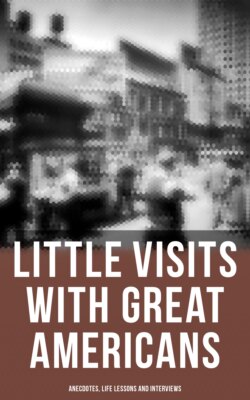Читать книгу Little Visits with Great Americans: Anecdotes, Life Lessons and Interviews - Эндрю Карнеги - Страница 49
На сайте Литреса книга снята с продажи.
ALWAYS INTERESTED IN COMMERCE.
ОглавлениеTable of Contents
“No, I think not. I was always interested in the commercial side of life, and always thought I would be a merchant. To this end, I bent my energies, and soon realized that, successful or not, my labor would always be of a commercial nature.”
“When did you come to Chicago?” I inquired.
“I caught what was then the prevalent fever to come west, and grow up with the country, and west I came. I entered as a clerk in the dry goods house of Cooley, Woodsworth & Co., in South Water street.”
“Did you foresee Chicago’s growth in any way?”
“No, there was no guarantee at that time that the place would ever become the western metropolis. The town had plenty of ambition and pluck; but the possibilities of greatness were hardly visible.”
It is interesting to note in this connection that the story of Mr. Field’s progress is a wonderfully close index of Chicago’s marvelous growth. An almost exact parallel may be drawn between the career of the individual and the growth of the town. Chicago was organized in 1837, two years after Mr. Field was born on the far-off farm in New England, and the place then had a population of a little more than four thousand. In 1856, when Mr. Field, fully equipped for a successful mercantile career, became a resident of the future metropolis of the west, the population had grown to little more than eighty-four thousand. Mr. Field’s prosperity advanced in strides parallel to those of the city; with Chicago he was stricken but not crushed by the great fire of 1871, and with Chicago he advanced again to higher achievement and far greater prosperity than before the calamity.
“What were your equipments for success when you started as a clerk here in Chicago, in 1856?”
“Health, sound principles, I hope, and ambition,” answered Mr. Field.
“And brains,” I suggested; but he only smiled.
“What were the conditions here?”
“Well, merit did not have to wait for dead men’s shoes in a growing town, of course. Good qualities were usually promptly discovered, and men were pushed forward rapidly.”
“How long did you remain a clerk?”
“Only four years. In 1860, I was made a partner, and in 1865, there was a partial reorganization, and the firm consisted after that of Mr. Leiter, Mr. Palmer and myself (Field, Palmer & Leiter). Two years later Mr. Palmer withdrew, and until 1881 the style of the firm was Field, Leiter & Co. Mr. Leiter retired in that year, and since then it has been as at present: (Marshall Field & Co.)
“What contributed most to the great growth of your business?” I asked.
“To answer that question,” said Mr. Field, “would be to review the condition of the west from the time Chicago began until the fire in 1871. Everything was coming this way: immigration, railways and water traffic, and Chicago was enjoying what was called ‘flush times.’ There were things to learn about the country, and the man who learned the quickest fared the best. For instance, the comparative newness of rural communities and settlements made a knowledge of local solvency impossible. The old state banking system prevailed, and speculation of every kind was rampant. The panic of 1857 swept almost everything away except the house I worked for, and I learned that the reason they survived was because they understood the nature of the new country, and did a cash business. That is, they bought for cash, and sold on thirty and sixty days, instead of giving the customers, whose financial condition you could hardly tell anything about, all the time they wanted. When the panic came, they had no debts, and little owing to them, and so they weathered it all right. I learned what I consider my best lesson, and that was to do a cash business.”
